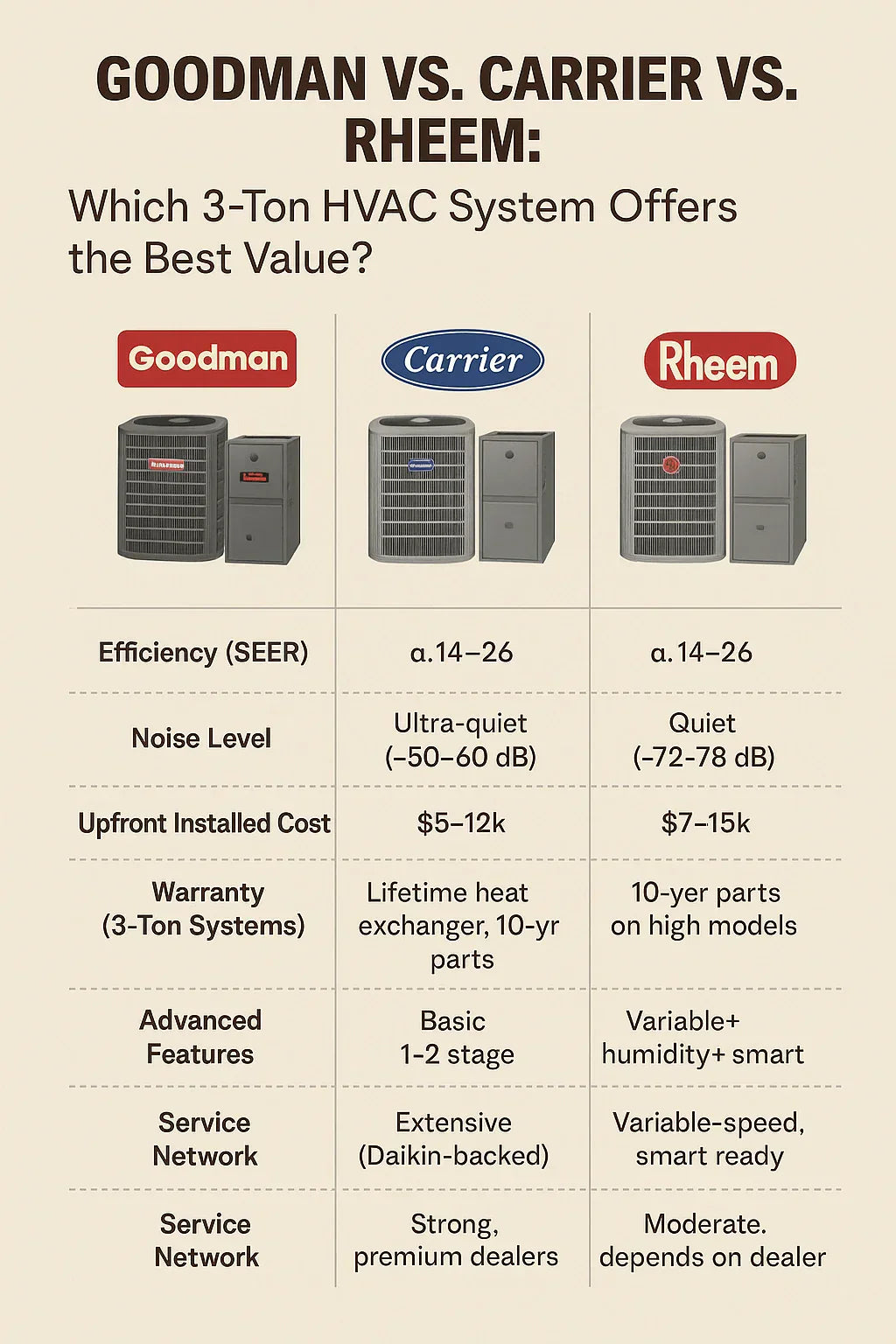🏧 1. Brand Profiles & Market Positioning
Goodman
Goodman is a Daikin-owned brand focused on affordability and reliability. Often praised for its simplicity and straightforward serviceability, Goodman systems are widely available and backed by a lifetime limited heat exchanger warranty and a 10-year parts warranty when registered.
-
Strengths: Budget-friendly, good warranty, easy maintenance.
-
Trade-offs: Fewer advanced features, moderately louder operation.
Rheem
Founded in 1925, Rheem is considered a balanced, mid-tier brand. Rheem systems often include more advanced features and modestly higher SEER ratings than Goodman, with some models offering EcoNet smart control integration and variable-speed compressors.
-
Strengths: Efficient, modern features, smart-home ready.
-
Trade-offs: Inconsistent dealer support, higher initial cost than Goodman.
Carrier
Carrier is a pioneer in HVAC, known for its premium-tier offerings and innovation in energy efficiency and comfort. With models reaching 26 SEER, whisper-quiet operation, and superior humidity control, Carrier systems are often preferred by homeowners prioritizing comfort above all.
-
Strengths: Ultra-quiet, energy efficient, excellent climate control.
-
Trade-offs: Highest upfront cost, expensive replacement parts.
📈 2. Side-by-Side Comparison
| Feature | Goodman | Rheem | Carrier |
|---|---|---|---|
| Efficiency (SEER) | ~14–17 | ~14–20.5 | ~14–26 |
| Noise Level | Moderate (71–75 dB) | Quiet (~72–78 dB) | Ultra-quiet (~50–60 dB) |
| Upfront Installed Cost | ~$5–12k | ~$5–13k | ~$7–15k |
| Warranty | Lifetime heat exchanger, 10-yr parts | 10-yr compressor/parts | 10-yr parts, extended options |
| Advanced Features | Basic 1–2 stage | Variable-speed, smart ready | Variable+humidity+smart |
| Dealer Network | Broad, Daikin-backed | Dealer-based, regional variability | Premium, certified installers |
⚒️ 3. Value Over Time
-
Goodman gives the best return on investment (ROI) for homeowners prioritizing budget and reliability. Its long warranty helps offset any performance compromises.
-
Rheem blends affordability with advanced features and comfort. Great middle-ground value.
-
Carrier excels in energy savings over time, with low noise and comfort features justifying the cost if long-term comfort is the goal.
🧰 4. Energy Efficiency & Operating Costs
-
A Carrier Infinity Series 3-ton unit can save hundreds annually over a decade compared to a basic Goodman or Rheem unit with ~14 SEER.
-
However, those savings often don’t justify the upfront cost for many homeowners.
⚖️ 5. Serviceability & Parts Availability
-
Goodman wins in ease of service and low part cost.
-
Rheem is solid, but depends heavily on dealer availability.
-
Carrier parts can be pricey and sometimes slower to obtain due to limited access through authorized dealers.
🔧 6. Installation Quality Matters More Than Brand
Even the best system can perform poorly if it’s installed incorrectly.
Key install factors:
-
Proper duct sizing and airflow testing.
-
Correct refrigerant charge.
Always hire a certified installer with brand experience and solid reviews.
🔗 7. Authoritative Resources for Further Reading
✅ 8. Final Take: Which Is Best for Mark?
-
Choose Goodman if you want affordable reliability, ease of service, and a solid warranty.
-
Choose Rheem if you want modern features without breaking the bank.
-
Choose Carrier if comfort, noise, and advanced tech matter more than cost.
For most value-conscious homeowners like Mark, the Goodman 3-ton system offers the best balance of cost, reliability, and warranty—especially when professionally installed and properly maintained.
In the next topic we will know more about: Understanding SEER2 and AFUE Ratings: What They Mean for Your Energy Bills







